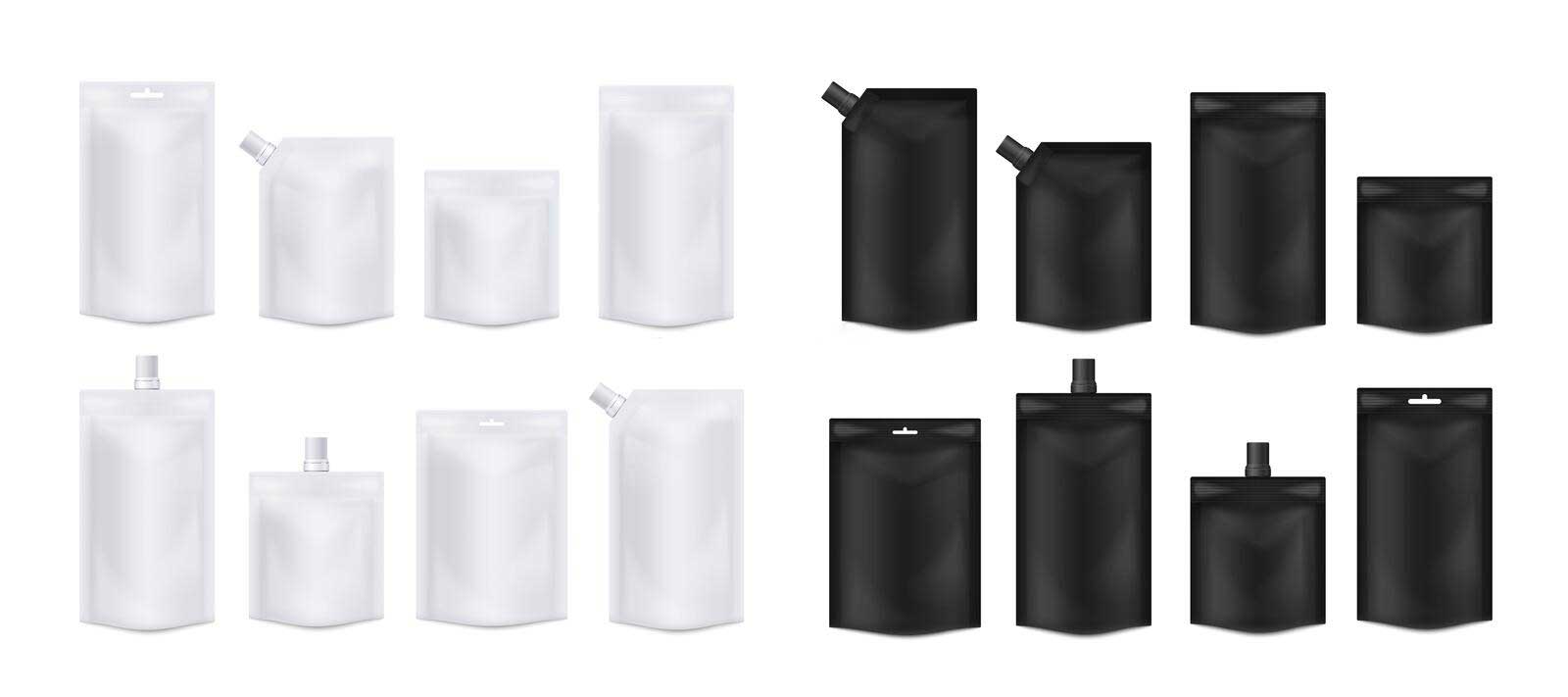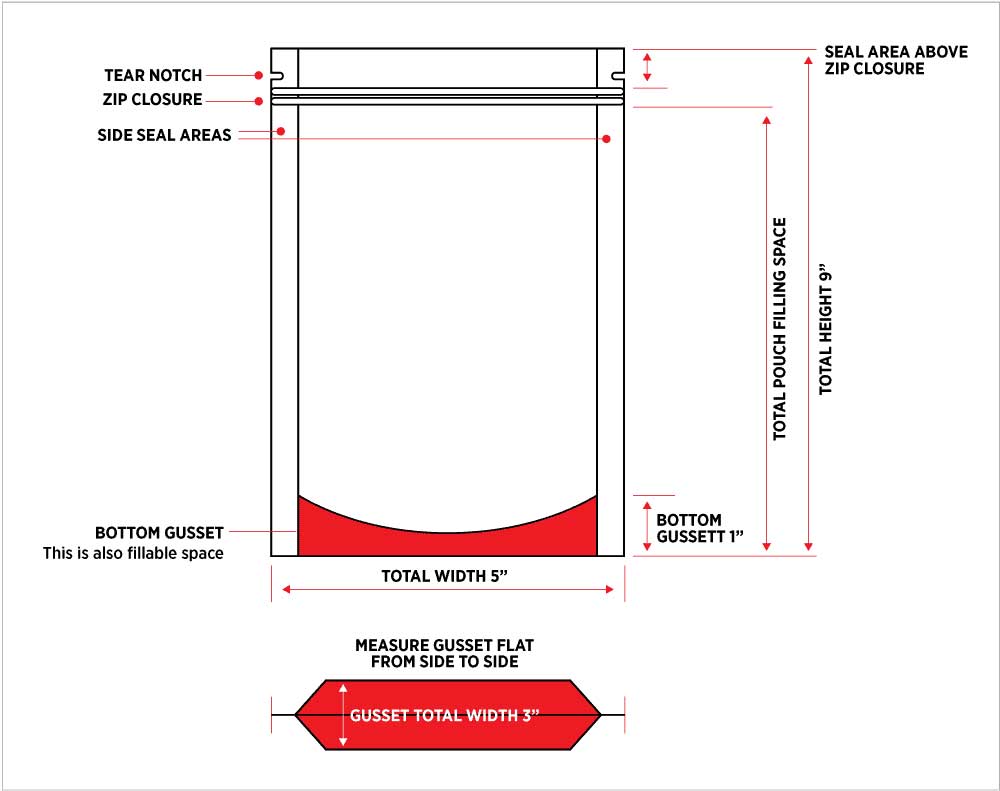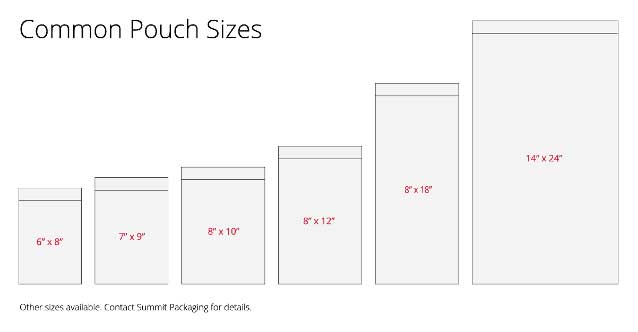A stand-up pouch’s size can be easily determined by knowing the size and characteristics of the bag you want. The standing pouch protects your product, makes it stand out on store shelves, and helps you save on packaging costs. Choosing the right pouch size is a good first step, and this article outlines some key things to help you get started.
With a self-supporting bag chart, we will discuss some important details to remember when determining the bag size. Once you have found the best size option, you can narrow your packaging search using other factors such as material thickness, type of packaging material, and bag characteristics.

1. How to determine the size of a stand up pouch
There are two important things to consider when figuring out how to calculate the bag size.
First of all, the size of the bag is always listed in the following order: width, height, and gusset, so if the third size is listed, you know that the bag contains a gusset. When measuring a gusseted bag, we recommend opening the bag and measuring the bottom of the bag from front to back to get an accurate reading. It is worth noting that some manufacturers think that 1/2 of the measured length is the size of the gusset, while others will specify the length of the entire gusset in the correct size.
Second, the measurement of the bag is always based on the external dimensions, as shown in the figure below.

Stand up pouch size chart
A chart with a stand-up pouch size chart showing how to measure the gusseted back, with the bottom, width, and height of the label
But here is an important point: there is a difference between the bag size and its actual filling space. For example, a 6 x 8-inch pouch is not necessarily suitable for a 5 x 6-inch product. This is why it is necessary to test the product first.
Please also keep in mind that the characteristics of the bag, such as zipper closure, sealing size, tearing notch, and hanging hole are all included in the overall size of the package, which can affect the filling space. A fillable space is the area under the bag left over after the zipper or heat seal line has been closed.
2. Check your volume
When choosing the right pouch size, it is important to understand the volume of the product. For example, 8-ounce high-density products, such as chicken, occupy less than 8-ounce bulky but light-weight products, such as granola.
Some larger items may even require you to use a large-sized pouch to hold the extra volume, so be sure to test your products in different-sized pouches before buying. In the packaging industry, the size of common stock stand up pouches ranges from 6×8 to 14×24.
At Hezcy, we provide these standard sizes, as well as custom station bags. Whether your packaging is fresh, dry, bulky, or smooth food, we have a choice that suits your product.
To give you a better idea of what size bag might be the best, here is a chart showing some of our customers’ products packed in stand up pouches:

Stand up pouch size chart
The various foods in the picture are arranged in a pyramid shape. If they all weigh 8 ounces, they will show the size of their stand-up pouches.
3. How Do You Fill Your Pouches?
Another important question to ask yourself is, what packaging equipment will I use? You may fill the bag manually, but if you use automation in your process, there are additional things to consider. How you package your products will affect the size, thickness, and type of packaging materials you need.
One of the reasons is that the power of the automatic filling machine will be greater than that of the manual filling machine, so you need to make sure that your machine will not damage the bag during the operation. Our equipment experts are happy to discuss packaging process options and how to choose the right stand-up pouch size and thickness to match.
4. Stock Stand Up Pouch
At Hezcy, we can meet the needs of standard bag sizes and beyond. Some common pouch sizes may be perfect for you. Having said that, every product is different, and every product requires precise specifications for safety reasons. This stand-up pouch size table will give us an idea of the range of standard bag sizes:
Demonstrates an illustration of six stock stand up pouches. 6×8, 7×9, 8×10, 8×12, and 14×24 are all vertical pouch sizes provided by Hezcy Packaging.

Stand up pouch size chart
To discuss all our size options, please contact us and we will get back to you right away.
5. Custom stand up Pouch
If the standard bag size does not fit your unique product, don’t worry. The custom station bag can be almost any size you need. Whether it’s candies, beef jerky, or fresh salmon, customized packaging solutions, are find them in Hezcy.
Our packaging experts work with customers every day to accurately develop custom sizes, and we hope to do the same for you. Customized stand bags deliver your products in the best design and safest packaging possible.
A few years ago, a friend of mine, was a smart lock supplier. It was he who suggested that I come to Hezcy to find the right self-supporting bag because here you can customize the self-supporting bag you want.
6. Pouch Size Calculator
It is not as easy as it seems to determine your ideal stand up pouch size with the bag size calculator. Every product and application is unique. This variety often requires trial and error to find the perfect packaging fit. The sizing strategy we outlined above is a good start to determine the volume of your product and understand how much the bag can hold. Another good start is the idea of testing small bags at home, in your kitchen, or pantry.
First, find a bag of similar products on your shelf. Then empty the bag and fill it with your product so that you can know the size of the bag you need. Similarly, you can go to any grocery store, buy a pouch related to your product, and try to fill it with your materials as a reference.
7. Stand up Pouch Sizes FAQs
Here are some common faqs for stand up pouches sizes:
Q: What size stand-up pouch do I need?
Knowing the volume of your product will help you determine the correct stand-up pouch size. Using this information as a starting point, you can test whether your product fits into a small bag. Whether you are using similar bags at home or getting sample bags from our packaging experts, there are many options to find the perfect bag size.
Q: How to calculate the size of the pouch?
To calculate the size of the stand up pouch, some measurement methods need to be tracked. The width and height of the bag, in some cases, the gusset size. The stand up pouch can only hold the product below the zipper or heat seal line. This is a key consideration when deciding what size bag to use.
Q: How to calculate the volume of the standing pouch?
To understand how much a stand up pouch can hold, it is first necessary to know the volume of your product. There is a difference between the size of the bag and its actual filling space. For example, a 6 x 8-inch pouch is not necessarily suitable for a 5 x 6-inch product.
Depending on how bulky your product is, you may need a larger stand-up pouch. Testing your product with bags from other products at home, or contacting a packaging expert is the best way to determine how much capacity your bag needs.
Q: How to measure the back pocket?
When measuring a gusseted bag, we recommend opening the bag and measuring the bottom of the bag from front to back to get an accurate reading. It is important to remember that the measurement of the bag is always based on the external dimensions, as shown in the image above.




Hi we are looking to make a product with 165ml liquid in a stand up spout pouch. What dimensions will fit this liquid with a 3cm gusset?
Thanks
Dear Calvin,
Thank you for interested in our products.
Creating a stand-up spout pouch for 165ml of liquid requires determining the dimensions of the pouch that will adequately contain that volume. We’ll also consider the 3 cm gusset you mentioned.
1. Determine the Volume: The volume we want to package is 165 ml or 165 cubic centimeters (since 1 ml = 1 cm³).
2. Gusset Contribution: A gusset is a triangular or rhomboid piece of fabric inserted into a seam to add breadth or reduce stress from tight-fitting clothing. In packaging, it provides extra space. The gusset will add to the volume of the pouch, so we’ll need to account for it.
3. Shape Assumption: Since we are not given the specific shape or other dimensions of the pouch, we can assume a common shape for stand-up pouches. Let’s assume that the pouch’s cross-section is rectangular.
With these considerations, we can calculate the dimensions.
Given:
• Volume of the liquid = 165 cm³
• Gusset width = 3 cm
• Length and width of the pouch = L and W, respectively
The volume of the pouch would be the sum of the volume of the rectangular body and the volume contributed by the gusset. Since the gusset is 3 cm, its volume contribution would be half of a cylinder with a 3 cm diameter, which is ½ x π x (3/2)² x L.
Combining these, we have:
165 = L × W × 3 + ½ x π x (3/2)² x L
We have two variables, L and W, and one equation, so we’ll need to make further assumptions or have more information to find unique values for L and W. The exact dimensions will depend on the desired proportions of the pouch. If you can provide more details about the desired shape or proportions, we can further narrow down the dimensions.
Best Regards,
Engineering team with Hezcy Packaging
For a same length and width of a gusseted pouch (say 200m L and 160 mm W), how is the gusset contributing to the fill volume. that is if 1/2 gussset is 40mm and 50 mm respectively, does the fill volume increase or decrease ?
Dear Manjunath,
The gusset of a pouch provides additional volume to the bag, allowing it to hold more content than a flat pouch with the same length and width dimensions. Essentially, a gusset acts as an expansion or pleat that increases the depth of the bag, and consequently, its volume.
To determine the additional volume provided by the gusset, we can calculate the volume of the gusseted portion of the pouch and then compare it to the volume of a flat pouch without a gusset.
Let’s break down the calculations:
1- Volume of a flat pouch without a gusset:
Volume flat = Length × Width
2- Volume of the gusseted portion:
Assuming the gusset expands uniformly, its volume can be calculated as:
Volume gusset = Length × Gusset width
3- The total volume of the gusseted pouch will be:
Volume Total =Volume flat + Volume gusset
If you provide two different gusset sizes, then the pouch with the larger gusset will have a greater volume.
Given:
• Length (L) = 200 mm
• Width (W) = 160 mm
• Gusset 1 (G1) = 40 mm (1/2 gusset means the full gusset would be 80 mm)
• Gusset 2 (G2) = 50 mm (1/2 gusset means the full gusset would be 100 mm)
Let’s calculate the fill volume for both gusset sizes and see which one provides a greater volume.
# Given dimensions
L = 200 # mm
W = 160 # mm
G1 = 40 * 2 # 1/2 gusset means full gusset would be 80 mm
G2 = 50 * 2 # 1/2 gusset means full gusset would be 100 mm
# Volume calculations
Volume_flat = L * W
Volume_gusset_1 = L * G1
Volume_total_1 = Volume_flat + Volume_gusset_1
Volume_gusset_2 = L * G2
Volume_total_2 = Volume_flat + Volume_gusset_2
Volume_flat, Volume_total_1, Volume_total_2
RESULT
(32000, 48000, 52000)
For the given dimensions:
1. Volume of a flat pouch without a gusset:
The volume is 32,000mm2 (or 32 cm^2).
2. Volume with a 80 mm gusset (from the 40 mm half-gusset):
The volume is 48,000mm2 (or 48 cm^2).
3. Volume with a 100 mm gusset (from the 50 mm half-gusset):
The volume is 52,000 mm2 (or 52 cm^2).
As observed, the fill volume increases with the size of the gusset. Specifically, the pouch with a gusset of 100 mm can hold more content than the one with an 80 mm gusset. So, the greater the gusset size, the larger the fill volume.
Best Regards,
The engineering team at Hezcy Packaging
October 20, 2023
Hello. I handmake luxurious, soothing bath salt bath products using Course and Fine Epson Salts and pink Himalayan Salts.
I will be using each type of salt individually and also together to create a different loo, (course with fine salt).
I’m wanting to use gusset bottom, stand up bags, heat sealeable bags with zipper closure. My capacity choices are bags that will accommodate 100 grams and 250 grams of TOTAL product.
Can you assist me in selecting the proper bags I need?
Thanking you!
Hello Carol,
Thank you for reaching out to us, and we’d be more than happy to assist you in selecting the appropriate stand-up pouches for your luxurious bath salt products!
For bath salts, especially with the granular nature of Epsom and Himalayan salts, it’s crucial to choose pouches that not only adequately contain the product but also showcase it aesthetically to potential customers.
For a 100-gram capacity, I would recommend a pouch size of approximately 5″ x 8″ with a 2.5″ bottom gusset. For a 250-gram capacity, a 6″ x 9″ pouch with a 3″ bottom gusset should be suitable. These dimensions ensure that the bags stand up effectively on store shelves and provide ample space for branding and product information.
Our pouches are heat-sealable and equipped with a zipper closure to ensure the freshness and quality of your bath salts. We can also customize the pouch material and printing to reflect the luxurious and soothing nature of your products.
If you need further customization or have specific branding requirements, please feel free to provide more details, and we’ll be more than happy to tailor our offerings to meet your exact needs.
Looking forward to the opportunity of working with you to package your exquisite bath salts elegantly and effectively!
Best regards,
The Hezcy Packaging Team
Hi! For various candies of 1,2 and 3 kilos, how do i choose which pouch to use?
Hi Nara,
To be more specific in choosing pouches for candies of 1, 2, and 3 kilos, consider both the physical dimensions and the volume capacity of the pouch.
For bulkier items like candies, opt for pouches with a wider base and enough height to accommodate the product’s volume. The gusset (bottom or side expansion) is also crucial for providing additional space. Typically, a larger gusset is needed for heavier products to ensure they sit well and are presented attractively.
It’s advisable to consult with our engineering team (engineering@hezcypak.com) who can offer tailored advice based on the exact dimensions and properties of your product.
Kind Regards,
Team of Hezcy
Dear Sir,
Good afternoon, please help to determine dimensions of flat pouch (trilaminate, with side sealed) for powder & granules packaging of 3 Kg & 5 Kg (bulk density of product is 0.55 gm/ml & 0.7 gm/ml respectively)
Dear Rajesh,
To determine the dimensions for flat pouches suitable for 3 Kg and 5 Kg of powder and granules with bulk densities of 0.55 gm/ml and 0.7 gm/ml respectively, you’ll need to calculate the volume of the product and then translate that into pouch dimensions considering additional space for sealing and handling. The process involves converting the weight into volume using the given densities and then accounting for the pouch’s gusset, width, and length to ensure the product fits comfortably without overfilling. For precise calculations, factors such as the product’s flow characteristics, the pouch material’s thickness, and sealing areas must be considered. It’s recommended to test different sizes to find the optimal one, as actual product volume and packaging needs can vary. For detailed guidelines on calculating stand-up pouch sizes.
It’s advisable to consult with Hezcy’s engineering team (engineering@hezcypak.com) who can offer tailored advice based on the exact dimensions and properties of your product.
Kind Regards,
Team of Hezcy